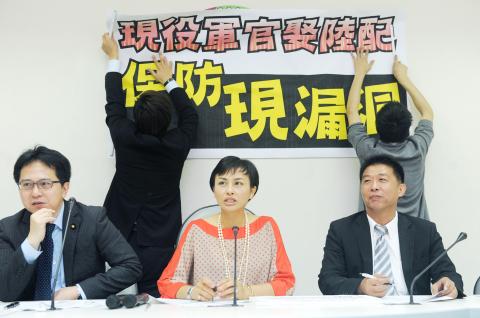|
Concerns raised over
Chinese spouses
SECURITY FEARS: DPP Legislator Chiu Chih-wei
said military personnel married to Chinese citizens should not be able work in
sensitive, intelligence-related positions
By Chris Wang / Staff reporter

Democratic Progressive Party
legislators Chiu Chih-wei, Chiu Yi-ying and Hsu Chih-chieh, left to right, speak
to reporters in Taipei yesterday about their concern over marriages between
military personnel working in sensitive units and Chinese spouses.
Photo: Liao Chen-huei, Taipei Times
Democratic Progressive Party (DPP)
lawmakers yesterday voiced concern about marriages between military personnel
and Chinese nationals, saying such unions raised the risk of security leaks.
DPP Legislator Chiu Chih-wei (邱志偉) told a press conference that applications and
reviews should be required for military officers who want to marry a Chinese
citizen.
The government should follow the example set by the Japan Self Defense Forces,
which has assigned 600 personnel with Chinese spouses to positions unrelated to
sensitive military intelligence, Chiu said.
A Chinese-language media report on Friday cited Ministry of National Defense
statistics as showing at least 70 members of the military working in sensitive
units have Chinese spouses, including a colonel who works in the Armaments
Bureau.
The ministry said on Friday that not all personnel with Chinese spouses work in
sensitive positions. It also said the Personal Information Protection Act
(個人資料保護法) barred it from asking for the nationality of the spouses.
Since a marriage regulation for military personnel was abolished in 2005, active
duty personnel no longer have to report their relationships to their units or
seek approval for marriage.
DPP Legislator Chiu Yi-ying (邱議瑩) said the ministry has contradicted itself in
recent remarks, since it would not have been able to provide the statistics
about the number personnel with Chinese spouses if the law really did prohibit
the gathering of such personal information.
“We do not oppose cross-strait marriages, but we wonder how the personnel
completed their marriage registration, as the laws of the People’s Republic of
China stipulate that registration requires the presence of a couple at
government agencies in China,” she said.
Political Warfare Department Director-General Wang Ming-wo (王明我) told the
legislature that the spouses in question all have Republic of China citizenship.
Wang and Minister of National Defense Kao Hua-chu (高華柱) both said that military
personnel married to Chinese had married in Taiwan, not China, and the ministry
has maintained a comprehensive security check network.
Chinese Nationalist Party (KMT) Legislator Lin Yu-fang (林郁方) said he supported
the ministry keeping a list on the nationality of military spouses, but a demand
for marriage applications and reviews would breach of human rights.
|
![]()
![]()
![]()